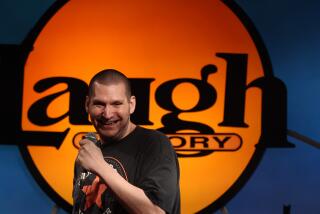Disabled actors and advocates plead to Hollywood: ‘Give us a chance, please!’
When Hollywood discusses diversity, it tends to focus on race, gender and, maybe, sexual orientation — but it almost always ignores disability. This was the consistent refrain and impetus behind the Ruderman Studio-Wide Roundtable on Disability Inclusion held Tuesday in Beverly Hills by the Ruderman Family Foundation.
“There is something wrong with this picture,” said Marlee Matlin, an Oscar-winning actress. “We as an industry keep talking about diversity — we know we have a problem. But, sadly, when we start speaking about diversity, disability seems to be left out far too often.”
Jay Ruderman, president of the foundation, added: “As Hollywood begins to come to terms that the entertainment industry needs to reflect modern day America, it is imperative that the largest minority among us, people with disabilities, is not left by the sidelines.”
Audiences want to see us and we want to be seen. We deserve 110% to be seen.
— Oscar-winner Marlee Matlin
The event, broken in two parts to tackle representation in front of and behind the camera, featured notable advocates in the differently abled community including Matlin, who is deaf, actor Danny Woodburn (“Jingle All the Way” and “Seinfeld”), who is a little person, and Jason George, who serves as chair of SAG-AFTRA’s national diversity committee. Also in attendance were director Jenni Gold, casting director April Webster and talent agent Gail Williamson, among others.
The roundtable came just four months after the Ruderman Foundation, an internationally recognized organization that advocates for people with disabilities, released its White Paper on Employment of Actors With Disabilities in Television. The study found that despite those with disabilities (visible and nonvisible) representing nearly 20% of the country’s population, about 95% of characters with disabilities on television are played by able-bodied actors. Additionally, they found that a plurality of actors with disabilities worked less than once a year and were repeatedly subjected to negative stigma and preconceived biases by casting agents and producers.
“While the numbers are disheartening, we are showing up more and more on-screen in commercials, movies and television,” Matlin said. “Audiences want to see us and we want to be seen. We deserve 110% to be seen.”
Conversation at the event focused, in part, on the industry’s response to #OscarsSoWhite, which prompted the film academy to announce a commitment to diversity. That definition of diversity, however — which the industry at large endorsed — did not include people with disabilities. The influence of the film academy’s action, Woodburn said, can be seen in policy, notably in New York where the Writers Guild of America, East endorsed and lobbied for modifications to the Empire State Film Production Tax Credit to give tax breaks to producers and studios that use writers of color and women.
“That was their idea of being diverse,” he said.
We’re talking about a group of people who are invisible right now, being treated like second-class citizens.
— Actor Orlando Jones
A question posed by actor Robert David Hall, who moderated one of the discussions, inspired talk about what some have called “disability drag,” or having able-bodied actors playing disabled characters. (This conversation arose this year with the release of “Me Before You,” a film that follows the relationship between a young bankerby left paralyzed after an accident and his caregiver. Some believed the casting of the able-bodied Sam Claflin was another example of the film industry limiting the roles actual disabled actors get to play.) Actor Orlando Jones answered, clarifying that “no one is arguing that actors shouldn’t do what actors do.
“But we’re talking about a group of people who are invisible right now, being treated like second-class citizens,” he said. “When representation is only making fun of disabled people or asking little people to bite someone’s butt or disabled people having to ask for permission to get the opportunity to get a job, then clearly there is a little bit of human rights abuses going on.”
“Speechless” actor Micah Fowler, who has cerebral palsy, said: “We can act too.… Give us a chance. Please!”
For more from the Ruderman Studio-Wide Roundtable on Disability Inclusion, follow the hashtag #HollywoodInclusion on Twitter.
Get your life! Follow me on Twitter: @TrevellAnderson.
More to Read
Only good movies
Get the Indie Focus newsletter, Mark Olsen's weekly guide to the world of cinema.
You may occasionally receive promotional content from the Los Angeles Times.











